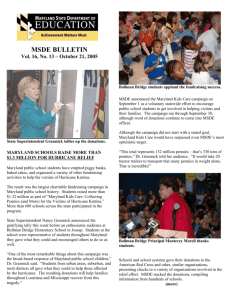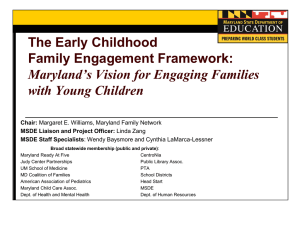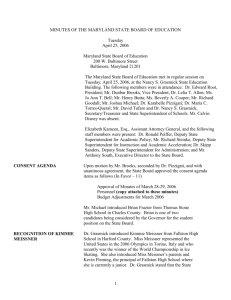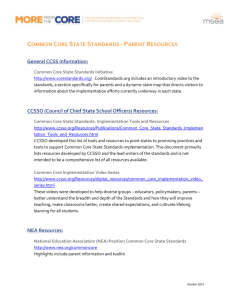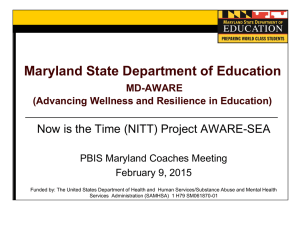December - Maryland State Department of Education
advertisement
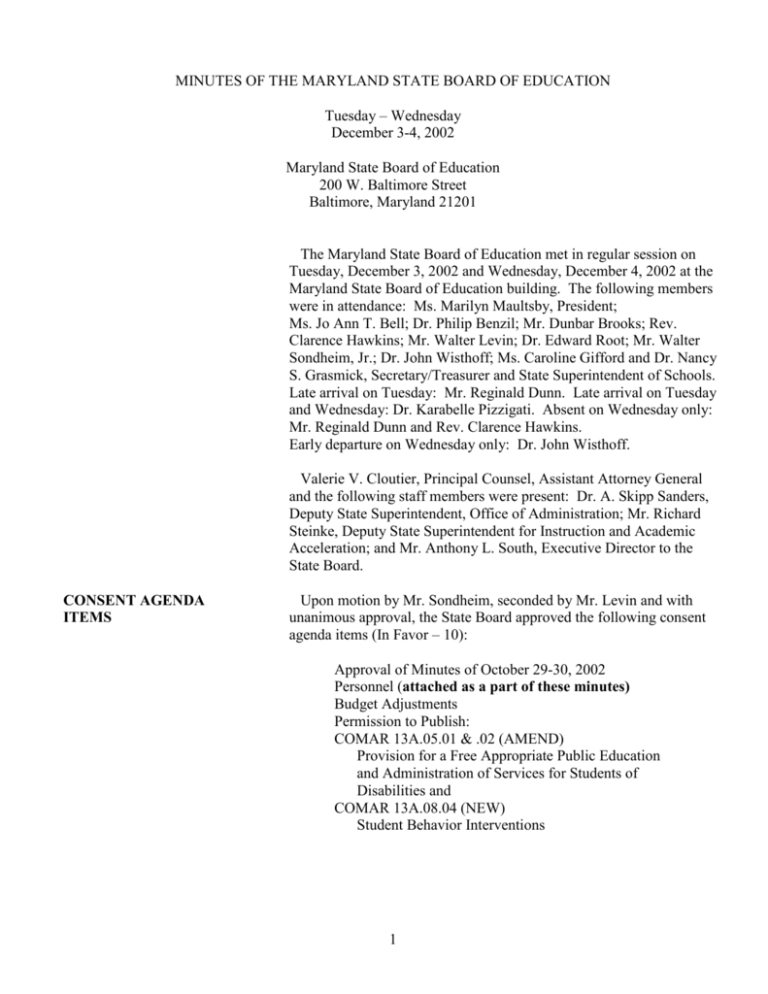
MINUTES OF THE MARYLAND STATE BOARD OF EDUCATION Tuesday – Wednesday December 3-4, 2002 Maryland State Board of Education 200 W. Baltimore Street Baltimore, Maryland 21201 The Maryland State Board of Education met in regular session on Tuesday, December 3, 2002 and Wednesday, December 4, 2002 at the Maryland State Board of Education building. The following members were in attendance: Ms. Marilyn Maultsby, President; Ms. Jo Ann T. Bell; Dr. Philip Benzil; Mr. Dunbar Brooks; Rev. Clarence Hawkins; Mr. Walter Levin; Dr. Edward Root; Mr. Walter Sondheim, Jr.; Dr. John Wisthoff; Ms. Caroline Gifford and Dr. Nancy S. Grasmick, Secretary/Treasurer and State Superintendent of Schools. Late arrival on Tuesday: Mr. Reginald Dunn. Late arrival on Tuesday and Wednesday: Dr. Karabelle Pizzigati. Absent on Wednesday only: Mr. Reginald Dunn and Rev. Clarence Hawkins. Early departure on Wednesday only: Dr. John Wisthoff. Valerie V. Cloutier, Principal Counsel, Assistant Attorney General and the following staff members were present: Dr. A. Skipp Sanders, Deputy State Superintendent, Office of Administration; Mr. Richard Steinke, Deputy State Superintendent for Instruction and Academic Acceleration; and Mr. Anthony L. South, Executive Director to the State Board. CONSENT AGENDA ITEMS Upon motion by Mr. Sondheim, seconded by Mr. Levin and with unanimous approval, the State Board approved the following consent agenda items (In Favor – 10): Approval of Minutes of October 29-30, 2002 Personnel (attached as a part of these minutes) Budget Adjustments Permission to Publish: COMAR 13A.05.01 & .02 (AMEND) Provision for a Free Appropriate Public Education and Administration of Services for Students of Disabilities and COMAR 13A.08.04 (NEW) Student Behavior Interventions 1 REPORT ON THE ENROLLMENT TASK FORCE Ms. Tina Bjarekull, Chair, Enrollment Task Force, reviewed the recommendations in this interim report. The Bridge to Excellence in Public Schools Act required the Maryland State Department of Education to form a committee to study enrollment issues in order to ensure that the school finance system accurately reflects the workload of each school system. A final report is due to the Governor and the General Assembly by December 20, 2003. The committee held meetings to review: historical trends in student enrollment; projections on future student enrollment; current enrollment collection policies and procedures; the budget preparation process; and, enrollment collection policies adopted by other states. Ms. Bjarekull stated that the committee elected to produce an interim report to include recommendations to address a number of immediate concerns about the enrollment collection process. The interim recommendations of the committee are: (1) In order to establish a comparable date to collect enrollment data for at-risk students, the Enrollment Committee recommends that the State change the enrollment collection date for special education students to the last Friday in October. (2) In order to establish a comparable collection date for at-risk student data and collect data in time to prepare reliable budget requests, the Committee recommends that the State collect (Limited English Proficient) LEP enrollment data on October 31. (3) The Committee reviewed and approved a new data collection instrument for LEP student enrollment. (4) The Enrollment Committee reviewed and approved a new collection report for free and reduced price meal (FRPM) enrollment used to calculate State aid to capture FRPM students enrolled in grades K-12 only. (5) To provide consistency in the enrollment collection dates, the Enrollment Committee recommends that the State enact legislation changing the enrollment collection date for the disabled student transportation grants from the second prior fiscal year to the prior fiscal year. In addition, the Enrollment Committee recommends that MSDE change the enrollment collection date for the disabled student transportation grant to the last Friday in October to coincide with the special education enrollment counts. 2 REPORT ON THE ENROLLMENT TASK FORCE (continued) (6) The Enrollment Committee reviewed and approved draft changes to COMAR regulations regarding the school finance structure. (7) The Committee recommends that MSDE revise the Maryland Student Records Manual and the Records Retention and Disposition Manual for Public Schools in Maryland. (8) The Committee recommends that MSDE, in collaboration with the Committee, review audit policies and procedures during the 2003 Legislative Interim and propose recommendations. Upon motion by Dr. Benzil, seconded by Ms. Bell, and with unanimous approval, the State Board approved the interim recommendations of the committee and granted permission to publish the proposed COMAR changes. (In Favor – 12) WAIVER OF ATTENDANCE REQUIREMENT Dr. Grasmick indicated a request has been received from Dr. Weast, Superintendent, Montgomery County Public Schools and is awaiting a waiver request from Dr. Metts, CEO, Prince George’s County Public Schools, to waive the practice that is used to calculate the normal yearly attendance rates for their respective school systems. These schools systems provided a liberal attendance policy during the period of the sniper attacks. Upon motion by Dr. Benzil, seconded by Mr. Levin, the State Board granted Dr. Grasmick permission to work with MSDE staff to determine a fair arrangement for the schools that were impacted by this attendance issue. (In Favor –12) HIGH SCHOOLS/ MIDDLE SCHOOLS THAT WORK Ms. Kathy Oliver, Assistant State Superintendent, Division of Career Technology and Adult Learning; Dr. Lynne Gilli, Program Manager, Career Technology Education Instruction Branch, Division of Career Technology and Adult Learning; and Dr. Bernard Sadusky, Superintendent, Queen Anne’s County Public Schools, provided an update on the progress of this initiative The Southern Regional Education Board’s High Schools That Work (HSTW) initiative is the nation’s largest and fastest growing effort to combine challenging academic courses and career and technology studies to raise the achievement of career-bound students. The effort began in 1987 as a consortium of states, school systems and school sites. 3 HIGH SCHOOLS/ MIDDLE SCHOOLS THAT WORK (continued) Ms. Oliver reported that in the winter of 2002, approximately 1,300 grade 12 students in Maryland were assessed in the subjects of reading, mathematics and science using a portion of the National Assessment of Educational Progress (NAEP). The results of the assessment are not intended to evaluate the progress of individual students but to help teachers learn more about their school program and students’ academic experiences. The major goals of High Schools that Work is to: (1) improve the mathematics, science, communications, problem-solving and technical achievement of all youth; and, (2) to blend the essential content of college preparatory studies – mathematics, science and language arts – with quality career technical studies by creating conditions that support school leaders, teachers and counselors in implementing key practices. Ms. Oliver reviewed the 2002 HSTW assessment results which show that the work being done at the local level is increasing student achievement. It appears that the sites making HSTW an integral part of the school improvement planning process are demonstrating gains in reading, mathematics and science. The six things that matter most in the HSTW initiative are: 1. Engaging students in challenging assignments that meet curriculum and performance standards. 2. Requiring students to complete rigorous and challenging academic and technical courses. 3. Ensuring that every student gets the extra help and intervention needed. 4. Focusing on successful transitions. 5. Ensuring academic guidance and advisement 6. Focusing on the important capacity building needs of our teachers through professional development and networking. The action agenda for change will require every site (1) sign a memorandum of understanding which will be renewed on an annual basis; (2) benchmark their performance against the highest performing sites; and, (3) provide professional development and networking through a newly formed High Schools That Work State Council. 4 HIGH SCHOOLS/ MIDDLE SCHOOLS THAT WORK (continued) Dr. Sadusky shared the successes, lessons learned and the next steps that will be implemented in Queen Anne’s County Public Schools to continue the progress being made to achieve the goals as measured by the High Schools That Work assessment. UPDATE – QUALITY TEACHER WORK GROUP Dr. Edward Root, Chair, Quality Teacher Work Group reported that the committee has already held four meetings and has received 181 recommendations from a diverse group of representatives that included: PTA, two & four year colleges, Board members; teachers; principals; superintendents; personnel directors; local teacher associations; and professional and national organizations. Dr. Root stated that at the next meeting the recommendations will be shared with the entire committee. The committee will then begin the process of combining those recommendations that overlap. The committee is expected to have the recommendations completed by December 16, 2002. MARYLAND VIRTUAL LEARNING OPPORTUNITIES Ms. Jayne Moore, Director, Instructional Technology Unit, Division of Instruction, and Dr. Liz Glowa, MSDE Coordinator for Web-based Learning, provided a report of this program. Dr. Glowa reviewed the recommendations of the Web-based Learning Study Group previously shared with the Board. The recommendations of the study group were: (1) MSDE provide the leadership and develop a coordinated approach to the implementation of Web-delivered courses in Maryland; and, (2) MSDE encourage the districts to explore Webdelivered courses by providing local school systems with information, advice, support, and knowledge of other resources. Currently there are 10 school systems offering on-line courses. The major accomplishments include (1) on-line courses for students; 2) online professional development; and (3) the development of resources that are posted into a web-site. The next steps include: 1. piloting the use of on-line courses in partnership with several school systems; 2. continuing to help bargain and negotiate funding; 3. reviewing every course that’s bid and making sure it meets quality assurance standards. Funding for expansion of this program was included in MSDE’s headquarters budget enhancement request that has since been denied. It is anticipated that there may be funding available in the No Child Left Behind legislation that can be used for this program. 5 STATUS REPORT ON DEVELOPMENT OF MASTER PLAN GUIDELINES Ms. JoAnne Carter, Assistant State Superintendent, Division of Student and School Services, and Mr. Ronn Friend, Director, Comprehensive Planning and School Support Office, Division of Student and School Services; provided a progress report on the Department’s guidance on the master plan requirements under the Bridge to Excellence in Public Schools Act. The Bridge to Excellence in Public Schools Act restructures Maryland’s public school finance system and increases State aid to public schools. As a result of this legislation, Maryland will embrace a standards-based approach to public school financing. Under this approach, MSDE must set academic performance standards, ensure that schools and students have sufficient resources to meet those standards, and hold schools and school systems accountable for student performance. Each local school system must develop a five-year comprehensive master plan that includes goals, objectives, and strategies the systems will use to improve student achievement as well as meet state performance standards and local performance standards for each segment of the population. The master plans and annual updates must be submitted to MSDE for review and approval. Ms. Carter indicated that a Master Plan Workgroup was established to develop guidelines and procedures to be used by local school systems to prepare their Bridge to Excellence Master plans. The guidance will show integration between recommendations from the Visionary Panel, requirements under No Child Left Behind legislation as well as the Bridge to Excellence Public Schools Act. The guidance is meant to convey information about key programs and fiscal requirements that are incorporated in it. It requires that the school systems be given greater flexibility and responsibility for determining how they will spend the resources under the Bridge to Excellence Act. The key components that must be included in the Master Plan are: 1. The plan must be aimed at helping all children meet state and local performance standards, improve student achievement, and close academic gaps among students of different racial, ethnic, and economic backgrounds, students with disabilities, and students who are learning English. 2. The plan must be comprehensive and systemic and reach throughout the school system to all schools and address factors central to improved teaching and learning – such 6 STATUS REPORT ON DEVELOPMENT OF MASTER PLAN GUIDELINES (continued) as teacher and principal recruitment and retention, professional development, use of best practices and research-based strategies, and extended learning opportunities. 3. The plan must address services to prekindergarten students, gifted and talented students, and students enrolled in career and technology courses. 4. The plan must include specific benchmarks and timelines for (1) improved student achievement and (2) progress in implementing the plan. 5. The plan must include an Executive Summary. The Master plan must be shared with local governments 60 days prior to submission to MSDE. The plans are due to MSDE on October 1, 2003. MSDE is required to review and approve each school system’s five-year master plan and to do annual reviews on the basis of progress made against the identified targets. There will also be a provision for intervention by the State Superintendent and State Board for those systems not meeting the annual targets. RECESS AND EXECUTIVE SESSION Pursuant to §10-503(a)(1)(i) & (iii) and §10-508(a), (1), (7), (8), & (11) of the State Government Article, Annotated Code of Maryland, and upon motion by Ms. Bell, seconded by Dr. Root, and with unanimous agreement, the Maryland State Board of Education met in closed session on Tuesday, December 3, 2002, in Conference Room 1 at the Maryland State Department of Education. The executive session commenced at 12:50 p.m. The following members were in attendance: Marilyn Maultsby; Reginald Dunn; Jo Ann T. Bell; Philip Benzil; Dunbar Brooks; Clarence Hawkins; Walter Levin; Karabelle Pizzigati; Edward Root; Walter Sondheim, Jr.; John Wisthoff; Caroline Gifford; Nancy S. Grasmick; A. Skipp Sanders; Richard Steinke; Valerie V. Cloutier; and Anthony South. The State Board discussed an internal management matter and gave the Board President direction on next steps. The State Board deliberated the following appeals and the decisions of these cases will be announced publicly: Baltimore Teachers Union and City Union of Baltimore City v. Baltimore City Board of School Commissioners – unfair labor practices regarding composition of units and designation of confidential and management personnel 7 RECESS AND EXECUTIVE SESSION (continued) Jennifer Becker v. Carroll County Board of Education – student transfer Kenneth Etefia v. Montgomery County Board of Education – nonrenewal of teaching contract Kaliym Hill and Yvette Butler v. Montgomery County Board of Education – student transfer Richard Regan v. Montgomery County Board of Education (VI) – American Indian mascot dispute Richard Regan v. Prince George’s County Board of Education – American Indian mascot dispute Lisa & Mike Zepp v. Carroll County Board of Education – student transfer The State Board also authorized the issuance of seven pending opinions. At 1:25 p.m. Mark Moody joined the State Board to discuss issues related to the administration and scoring of the MSPAP tests and the High School Assessment Tests of 2002. Mark indicated to the Board that the scores would be released on Thursday, December 5, 2002 at 9:00 a.m. The State Board took no action on this matter. Mark Moody left the State Board at 1:50 p.m. John Lang and Steve Brooks joined the State Board at 1:50 p.m. and discussed cost containment issues. The State Board gave Dr. Grasmick guidance on next steps. John Lang and Steve Brooks left the State Board meeting at 2:10 p.m. Dr. Grasmick discussed issues involving the magnet school plan in the Prince George’s County public school system. Dr. Grasmick indicated that she would present a proposal for an extension of the time line on the magnet school plan to the State Board for its consideration at the open meeting on Wednesday, December 4, 2002. The State Board took no action on this matter. Dr Grasmick reminded the State Board that as of July 1, 2003, there will be three vacancies on the Baltimore City Board of School Commissioners. The Sate Board agreed to begin the recruitment process in early spring of 2003. Ms. Cloutier advised the State Board on the proposed revision to the multicultural education regulations that is pending. Dr. Grasmick indicated that Senator George Della is the new chair of 8 RECESS AND EXECUTIVE SESSION (continued) the AELR. The Board requested Dr. Grasmick to confer with Senator Della about the proposed revision. Dr. Grasmick will provide the State Board with an update at its January meeting. Ms. Cloutier advised the Board on issues raised by the Home School Legal Defense Fund. The State Board took no action on this matter. The executive session concluded at 2:30 p.m. LEGAL ARGUMENT The Board heard oral argument in the following case: Jerome DeMarchi v. Montgomery County Board of Education PUBLIC COMMENT The Board heard comments from the following persons: John Shilts Gary L. Cox Fred Gleockler Scott Somerville Julie Wesolek Bob Beller Jerome Dancis Alice Gordon Billy Greer UPDATE ON 2001-2002 ASSESSMENT RESULTS Dr. Mark Moody, Assistant State Superintendent, Division of Planning, Results and Information Management, and Dr. Ron Peiffer, Assistant State Superintendent, School and Community Outreach Office, provided an update on these assessment results. Dr. Moody reported that on Thursday, December 5, 2002 two different sets of assessments scores will be released - Maryland School Performance Assessment Program and the high school assessment. In consultation with the U.S. Department of Education, it was decided that the 8th grade MSPAP test would only be given to those school systems that had Title I schools. The MSPAP test was scored out of state this year in an attempt to use less teacher time and return the results faster. There is a difference in the scoring by out of state testers as compared to Maryland teachers. To make adjustments to the scoring a variety of psychometric procedures were used but the margin of error is larger this year than it has been in the past. The high school assessment was administered in January and May of last year. This will be the first time that the high school assessment results will be reported. These scores will go on student transcripts with the exception of the results of the Geometry 9 UPDATE ON 2001-2002 ASSESSMENT RESULTS (Continued) assessment. The individual scores will be percentile ranked. For each school the median percentile rank of students within that school and for each school system will be reported. Dr. Peiffer reported that packets of information have been prepared that will assist stakeholders in understanding the results of these assessments. The two critical messages on the high school assessments are: (1) the State Board has not made a decision to link the high school assessment to a diploma; and (2) there is no qualifying score at this moment because standards setting will occur this summer. PROGRESS REPORT ON DEVELOPMENT OF 2003 ASSESSMENTS Dr. Moody provided a progress report on the development of the new assessments. The new assessments are being developed over a six month period. The assessment system must yield individual scores in math and reading and will eventually cover grades 3 – 8 and one test in high school grades 10-12. The first phase of the assessment will be administered to grades 3, 5, 8 and grade 10 in 2003. In 2004, field tests will begin for grades 4, 6, and 7. The items have been written and have gone through reviews both for content, bias and sensitivity. The target is to test enough items in March to create six different forms of the test. The test is scheduled to arrive in the local school systems in mid-January. School systems will administer the test the first week of March. Dr. Moody indicated that staff will begin the process of writing items for the Grades 4, 6, and 7 assessments beginning in January. EXECUTIVE SESSION AND ADJOURNMENT Pursuant to §10-503(a)(1)(i) & (iii) and §10-508(a)(7) of the State Government Article, Annotated Code of Maryland, and upon motion by Mr. Dunn, seconded by Ms. Bell, and unanimous agreement, the Maryland State Board of Education met in closed session on Tuesday, December 3, 2002, in the 7th floor Board Room at the Maryland State Board of Education. The executive session commenced at 4:20 p.m. The following members were in attendance: Marilyn Maultsby; Reginald Dunn; Jo Ann T. Bell; Philip Benzil; Dunbar Brooks; Clarence Hawkins; Walter Levin; Karabelle Pizzigati; Edward Root; Walter Sondheim, Jr.; John Wisthoff; Caroline Gifford; Nancy S. Grasmick; A. Skipp Sanders; Richard Steinke, Valerie V. Cloutier; and Anthony South. The State Board deliberated the following appeal and the decision of this case will be announced publicly: Jerome DeMarchi v. Montgomery County Board of Education – one semester suspension and demotion of assistant principal for test security violations. The executive session concluded at 4:45 p.m. 10 RECONVENED The State Board reconvened on Wednesday, December 4, 2002 at 9:08 a.m. MILKEN AWARD WINNERS Ms. Darla Strouse, Director, Corporate and Foundation Partnerships, introduced the Milken Award winners. The two award winners are: Jennifer Palmer, Reading Specialist Forest Lakes Elementary School Harford County Public Schools Terry Smith, Kindergarten Teacher Buckingham Elementary School Worcester County Public Schools Dr. Grasmick reviewed the history of the Milken Family Foundation National Educator Award. This program brings public recognition to educators throughout the country. Maryland became a partner in this program in 1994. The foundation sets the number of recipients each year and each State has the responsibility of reviewing the credentials of the teachers who are nominated. Board member Mr. Levin served on the selection panel for this year’s winners. Ms. Strouse introduced each of the winners. The Board viewed a video of the announcement of the winners at each of their respective schools. The Board heard remarks from each of the recipients. Each winner received the Milken National Educator crystal obelisk and a State Board citation. At the Milken National Educator Conference in California, each recipient will receive their $25,000 unrestricted cash award and a solid gold pen with the Milken logo. COMAR 13A.07 – END REGULATORY REVIEW (ADOPTION) Ms. Cloutier reviewed the regulatory review process and the proposed amendments. Under State law each agency is required to review its set of regulations every eight years to determine whether the regulations continue to be necessary for the public interest; continue to be supported by statutory and judicial authority; or whether they are obsolete or otherwise appropriate for amendment or repeal. In accordance with the statutory requirements, the review and evaluation of COMAR 13A.07 – 13A.13 was recently completed by the Department with input from a stakeholder review committee. Proposed amendments to the regulations were published in the Maryland Register. Comments were received on home schooling regulations and certification. The home school community objected to placing in regulation the existing policy that a parent or guardian must sign and file a statement each year with the local school superintendent indicating that the parent or guardian chooses to teach the child at home. Currently the regulation omits the term each year. The home 11 COMAR 13A.07 – END REGULATORY REVIEW (ADOPTION) (Continued) schoolers feel that they should have been consulted before the clarification was proposed. Upon motion by Dr. Benzil, seconded by Ms. Maultsby, the State Board tabled action on the home schooling regulations for 60 days. During that time a committee will be convened to include stakeholders from the home schooling community to review this regulation, and recommend procedures to be used by school systems to comply with this regulation. (In Favor – 10) Ms. Maultsby stressed that while the Board will convene this committee to review this regulation, the Board is adamant about the accountability of tracking students in home schooling on an annual basis or as frequent as deemed appropriate. The comments received regarding the certification regulations were non-substantive changes and will not require republication. Upon motion by Ms. Bell, seconded by Dr. Pizzigati, the State Board adopted the other regulations in this review process. (In Favor – 10) Ms. Cloutier also acknowledged the work of Ms. Joyce Smith, Regulations Coordinator, for the support she provides in keeping track of these regulations. DRAFT REGULATIONS ON UNSAFE SCHOOLS CHOICE OPTION Dr. Lynn Linde, Chief, Student Services and Alternative Programs Branch, Division of Student and School Services; Mr. Chuck Buckler, Specialist, Alternative Programs, Division of Student and and School Services; and Ms. Jacqueline LaFiandra, Assistant Attorney General, Office of Legal Counsel, provided a review of these draft regulations. Dr. Linde stated that Title IX of the No Child Left Behind (NCLB) Act of 2001 requires that each State establish and implement a statewide policy requiring that a student attending a “persistently dangerous” public elementary or secondary school, or who becomes a victim of a crime of violence, while in or on the grounds of a public elementary or second school that the student attends, be allowed to attend a safe public elementary or secondary school within the local school district. The NCLB Act of 2001 requires each State to define what constitutes a “persistently dangerous school.” The law currently went into effect July 1, 2002, but MSDE took the option of applying for a waiver of one year. This regulation must be in effect by July 1, 2003. A committee was formed to draft Maryland’s Unsafe School Choice Option regulations. The committee reviewed the use of existing suspension/expulsion data sets that were available and collected 12 DRAFT REGULATIONS ON UNSAFE SCHOOLS CHOICE OPTION (continued) annually on a statewide basis. Consideration was also given to the percentage of a school’s population that was suspended/expelled in a given school year. The proposed definition of a “persistently dangerous school” means a school in which over a period of three consecutive school years two and a half percent or more of the total student body has been suspended for more than 10 days or expelled for any of the following offenses: (a) (b) (c) (d) (e) (f) (g) (h) (i) Arson or fire; Drugs; Explosives; Firearms; Other guns; Other weapons; Physical attack on a student; Physical attack on a teacher or staff member; and Sexual Assault These draft regulations have been discussed with the local school superintendents who were asked to share these regulations with their staffs and their local school communities for feedback. After two consecutive years with 2.5 % of the student population having had any of the offenses listed, the school would be placed on a probationary period. The school would be required to write a corrective action plan, and notify the parents in that community. After the third year that the school experiences 2.5% of the student population suspended/expelled for such offenses, the school will be designated persistently dangerous and students provided the option of transfering to a different school. PERSONNEL ACTION Dr. Grasmick introduced Ms. Mary Clapsaddle who she is recommending for appointment to replace Tina Bjarekull, the former Deputy State Superintendent, Office of Finance. Upon motion by Ms. Bell, seconded by Dr. Levin, the State Board approved this personnel appointment. (In Favor – 10) STATE LEGISLATIVE UPDATE Ms. Renee Spence, State Legislative Liaison, provided a review of departmental legislation. The Department has only pre-filed one piece of legislation for this legislative session. A technical amendment is being made to HB9 – Teacher Quality Incentive Act. The amendment will indicate that a teacher with a 3.5 or 4.0 average and agrees to teach three years in a low performing school must have a Standard Professional Certificate, Advanced Professional Certificate or a Residency Teacher Certificate. 13 PRINCE GEORGE’S COUNTY MAGNET SCHOOL PROGRAM Dr. Grasmick discussed the revised plan to phase in the changes in the magnet school program in Prince George’s County. Dr. Metts has submitted a letter providing a status report regarding efforts to restructure the magnet school program consistent with obligations in Judge Peter Messitte’s Order granting unitary status. The Prince George’s County School Board is scheduled to approve this agreement in December. Upon motion by Ms. Bell, seconded by Mr. Levin, the State Board approved this revised plan with the provision that there be a review by the New Prince George’s County Board of Education along with their Superintendent to adhere to the timelines set forth. The consequences for not adhering to the timelines will be the withholding of funds. The Board empowered the State Superintendent to request any information she deems necessary in order to make decisions regarding the release of funds. PRESIDENT’S DISCUSSION Mr. Brooks will be attending a school construction task force meeting. Dr. Pizzigati attended the Quality Teacher Work Group meetings. She also attended the MABE Board of Directors meeting. Ms. Maultsby received a letter from the Governor thanking the State Board for its support during his term. She announced that the MABE regional meeting will be held on January 16th in Anne Arundel County. Ms. Maultsby, Dr. Grasmick and Ms. Cloutier will be participating in the MABE orientation session for newly elected/appointed members of the local school boards. Dr. Grasmick announced that Yale Stenzler, Executive Director, Public School Construction Program, will be retiring but will be returning in a contractual capacity. Ms. Bell met with several groups around the issue of certification. She has also attended the Quality Teacher Work Group meetings. Dr. Root has been chairing the Quality Teacher Work Group meetings. He has been appointed to a advisory group at the University of Maryland on budgetary concerns. He also attended CEASOM as a panel speaker on State partnerships. Dr. Grasmick has been asked to serve on a group with the Woodrow Wilson Foundation reviewing models for replicating the Bard School in New York. 14 OPINIONS Ms. Cloutier announced the following opinions: 02-55 Harvey L. Bias, Jr. v. Anne Arundel County Board of Education – The State Board affirmed the discipline and transfer of a school employee. 02-56 Ralph Cruz & Angela Morales v. Howard County Board of Education – Finding no due process violations or other illegalities, the State Board affirmed a 30-day student suspension. 02-57 Gregory T. and Janice P. Hard v. Carroll County Board of Education – The State Board affirmed the local board’s denial of a study transfer request. 02-58 Wardell Harmon v. Baltimore City Board of School Commissioners – The State Board affirmed a decision on a teacher evaluation. 02-59 Elaine and Daniel Lee v. Montgomery County Board of Education – The State Board affirmed a local board denial of a student transfer request. 02-60 Amy Rill v. Carroll County Board of Education -- The State Board affirmed a local board denial of a student transfer request. 02-61 Jennifer L. Watson & Brigid Monaghan v. Montgomery County Board of Education – The State Board has affirmed the denial of a student transfer request. The meeting adjourned at 12:10 p.m. Respectfully submitted, Nancy S. Grasmick Secretary/Treasurer APPROVED: January 29, 2003 NSG:sgc 15
